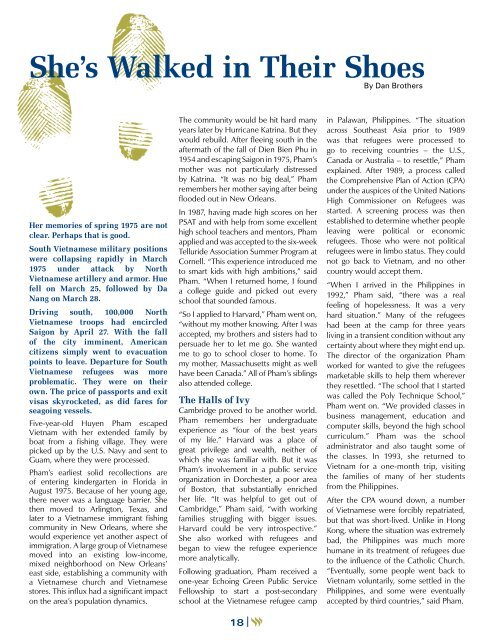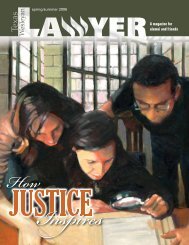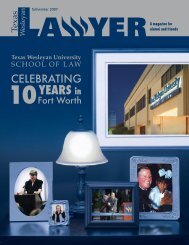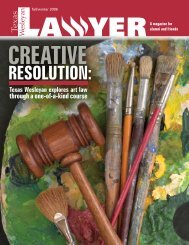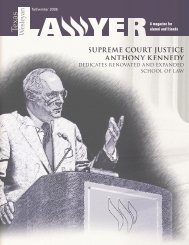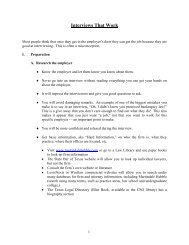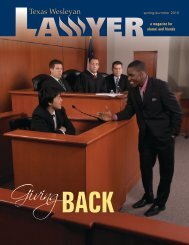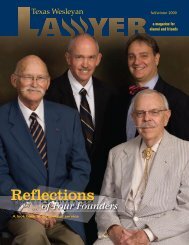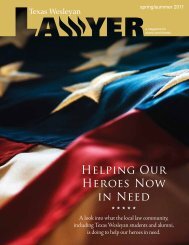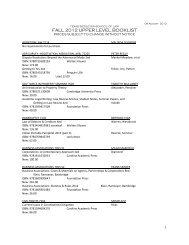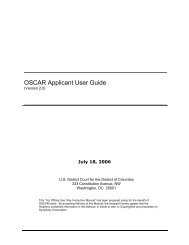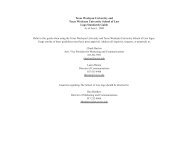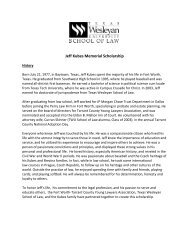Spring 2009 - Texas Wesleyan School of Law - Texas Wesleyan ...
Spring 2009 - Texas Wesleyan School of Law - Texas Wesleyan ...
Spring 2009 - Texas Wesleyan School of Law - Texas Wesleyan ...
You also want an ePaper? Increase the reach of your titles
YUMPU automatically turns print PDFs into web optimized ePapers that Google loves.
She’s Walked in Their Shoes<br />
By Dan Brothers<br />
Her memories <strong>of</strong> spring 1975 are not<br />
clear. Perhaps that is good.<br />
South Vietnamese military positions<br />
were collapsing rapidly in March<br />
1975 under attack by North<br />
Vietnamese artillery and armor. Hue<br />
fell on March 25, followed by Da<br />
Nang on March 28.<br />
Driving south, 100,000 North<br />
Vietnamese troops had encircled<br />
Saigon by April 27. With the fall<br />
<strong>of</strong> the city imminent, American<br />
citizens simply went to evacuation<br />
points to leave. Departure for South<br />
Vietnamese refugees was more<br />
problematic. They were on their<br />
own. The price <strong>of</strong> passports and exit<br />
visas skyrocketed, as did fares for<br />
seagoing vessels.<br />
Five-year-old Huyen Pham escaped<br />
Vietnam with her extended family by<br />
boat from a fishing village. They were<br />
picked up by the U.S. Navy and sent to<br />
Guam, where they were processed.<br />
Pham’s earliest solid recollections are<br />
<strong>of</strong> entering kindergarten in Florida in<br />
August 1975. Because <strong>of</strong> her young age,<br />
there never was a language barrier. She<br />
then moved to Arlington, <strong>Texas</strong>, and<br />
later to a Vietnamese immigrant fishing<br />
community in New Orleans, where she<br />
would experience yet another aspect <strong>of</strong><br />
immigration. A large group <strong>of</strong> Vietnamese<br />
moved into an existing low-income,<br />
mixed neighborhood on New Orleans’<br />
east side, establishing a community with<br />
a Vietnamese church and Vietnamese<br />
stores. This influx had a significant impact<br />
on the area’s population dynamics.<br />
The community would be hit hard many<br />
years later by Hurricane Katrina. But they<br />
would rebuild. After fleeing south in the<br />
aftermath <strong>of</strong> the fall <strong>of</strong> Dien Bien Phu in<br />
1954 and escaping Saigon in 1975, Pham’s<br />
mother was not particularly distressed<br />
by Katrina. “It was no big deal,” Pham<br />
remembers her mother saying after being<br />
flooded out in New Orleans.<br />
In 1987, having made high scores on her<br />
PSAT and with help from some excellent<br />
high school teachers and mentors, Pham<br />
applied and was accepted to the six-week<br />
Telluride Association Summer Program at<br />
Cornell. “This experience introduced me<br />
to smart kids with high ambitions,” said<br />
Pham. “When I returned home, I found<br />
a college guide and picked out every<br />
school that sounded famous.<br />
“So I applied to Harvard,” Pham went on,<br />
“without my mother knowing. After I was<br />
accepted, my brothers and sisters had to<br />
persuade her to let me go. She wanted<br />
me to go to school closer to home. To<br />
my mother, Massachusetts might as well<br />
have been Canada.” All <strong>of</strong> Pham’s siblings<br />
also attended college.<br />
The Halls <strong>of</strong> Ivy<br />
Cambridge proved to be another world.<br />
Pham remembers her undergraduate<br />
experience as “four <strong>of</strong> the best years<br />
<strong>of</strong> my life.” Harvard was a place <strong>of</strong><br />
great privilege and wealth, neither <strong>of</strong><br />
which she was familiar with. But it was<br />
Pham’s involvement in a public service<br />
organization in Dorchester, a poor area<br />
<strong>of</strong> Boston, that substantially enriched<br />
her life. “It was helpful to get out <strong>of</strong><br />
Cambridge,” Pham said, “with working<br />
families struggling with bigger issues.<br />
Harvard could be very introspective.”<br />
She also worked with refugees and<br />
began to view the refugee experience<br />
more analytically.<br />
Following graduation, Pham received a<br />
one-year Echoing Green Public Service<br />
Fellowship to start a post-secondary<br />
school at the Vietnamese refugee camp<br />
18<br />
in Palawan, Philippines. “The situation<br />
across Southeast Asia prior to 1989<br />
was that refugees were processed to<br />
go to receiving countries – the U.S.,<br />
Canada or Australia – to resettle,” Pham<br />
explained. After 1989, a process called<br />
the Comprehensive Plan <strong>of</strong> Action (CPA)<br />
under the auspices <strong>of</strong> the United Nations<br />
High Commissioner on Refugees was<br />
started. A screening process was then<br />
established to determine whether people<br />
leaving were political or economic<br />
refugees. Those who were not political<br />
refugees were in limbo status. They could<br />
not go back to Vietnam, and no other<br />
country would accept them.<br />
“When I arrived in the Philippines in<br />
1992,” Pham said, “there was a real<br />
feeling <strong>of</strong> hopelessness. It was a very<br />
hard situation.” Many <strong>of</strong> the refugees<br />
had been at the camp for three years<br />
living in a transient condition without any<br />
certainty about where they might end up.<br />
The director <strong>of</strong> the organization Pham<br />
worked for wanted to give the refugees<br />
marketable skills to help them wherever<br />
they resettled. “The school that I started<br />
was called the Poly Technique <strong>School</strong>,”<br />
Pham went on. “We provided classes in<br />
business management, education and<br />
computer skills, beyond the high school<br />
curriculum.” Pham was the school<br />
administrator and also taught some <strong>of</strong><br />
the classes. In 1993, she returned to<br />
Vietnam for a one-month trip, visiting<br />
the families <strong>of</strong> many <strong>of</strong> her students<br />
from the Philippines.<br />
After the CPA wound down, a number<br />
<strong>of</strong> Vietnamese were forcibly repatriated,<br />
but that was short-lived. Unlike in Hong<br />
Kong, where the situation was extremely<br />
bad, the Philippines was much more<br />
humane in its treatment <strong>of</strong> refugees due<br />
to the influence <strong>of</strong> the Catholic Church.<br />
“Eventually, some people went back to<br />
Vietnam voluntarily, some settled in the<br />
Philippines, and some were eventually<br />
accepted by third countries,” said Pham.


